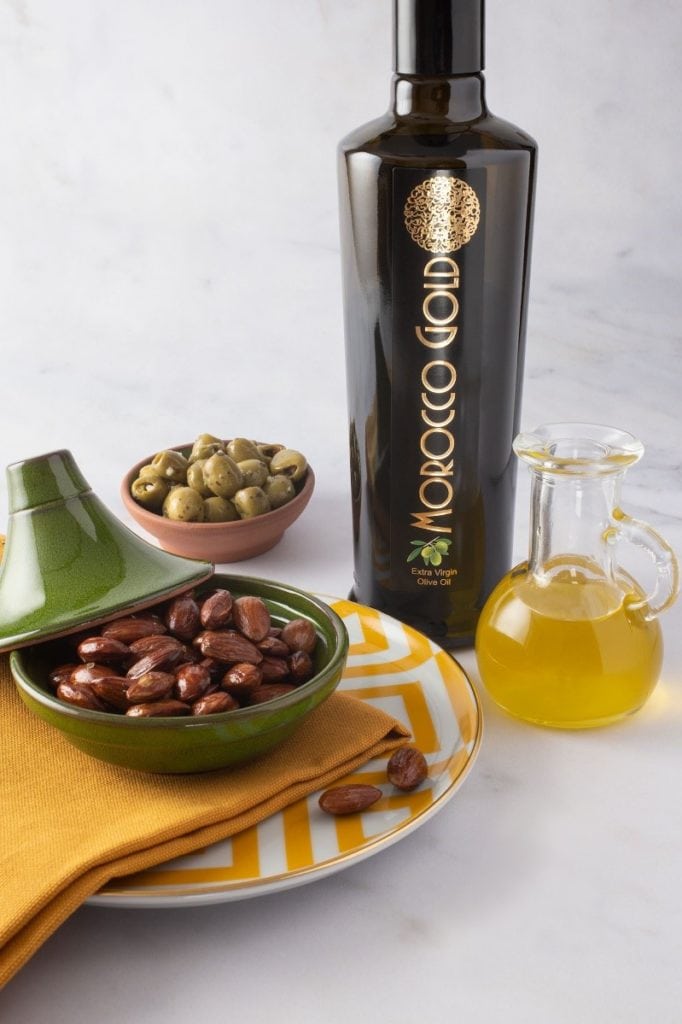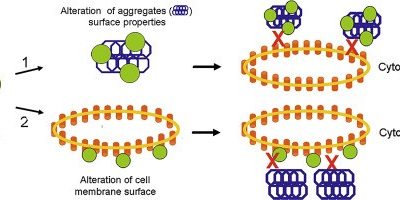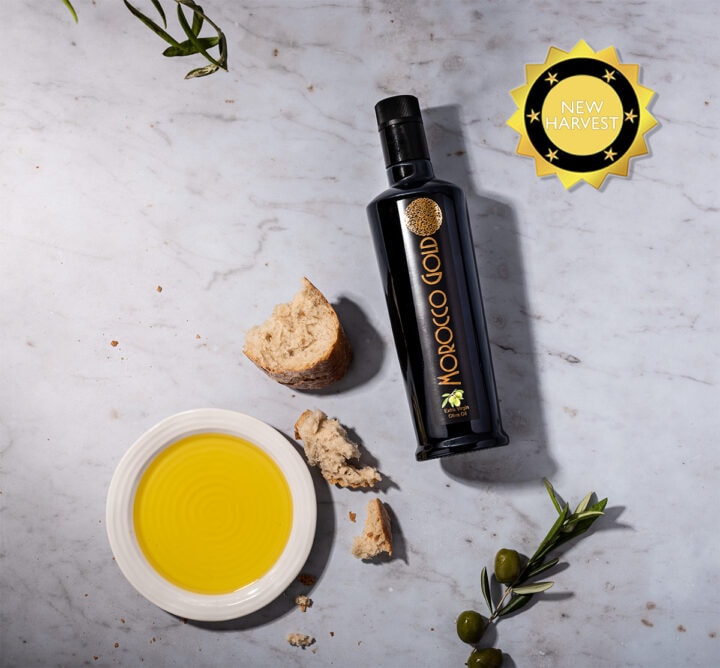Research Links Polyphenols In Extra Virgin Olive Oil To Digestive Health Benefits
Updated 3rd February 2023

SUMMARY
- Extra virgin olive oil is a staple in many diets, and for good reason – it’s delicious in dressings, sauces and marinades, and packed with powerful nutrients to support your overall health. One of the major components in extra virgin olive oil is its polyphenols, which research has linked to digestive health benefits.
- Studies have found that these health-promoting components can contribute to digestive health in numerous ways. The polyphenols in extra virgin olive oil can help reduce inflammation in your gut lining that can cause gastro-intestinal issues like leaky gut syndrome and irritable bowel syndrome. They also provide protection against bacteria and viruses. Not only this, but extra virgin olive oil is believed to stimulate the secretion of gut enzymes which nutrients need in order to be efficiently absorbed.
- Compared to other types of olive oil, extra virgin contains the highest levels of polyphenols, which means you reap all those wonderful benefits. It’s important to get the best extra virgin olive oil you can find though – not all extra virgin olive oils are created equal! Look for a high-quality extra virgin olive oil like Morocco Gold that is cold pressed so you can ensure you’re getting maximum benefits from its all-natural properties. When used properly, extra virgin olive oil is a great way to boost your gut health!
CONTENTS
- Extra Virgin Olive Oil Aids Digestion
- Polyphenols and Probiotics
- Which Polyphenols Are In Morocco Gold Extra Virgin Olive Oil?
- The Effect of Polyphenol Oleuropein Aglycone (OA) On Amyloidosis & Associated Bowel Dysfunction
- Understanding Digestive Disorders
- How Does Extra Virgin Olive Oil Help
Extra Virgin Olive Oil Aids Digestion
While extra virgin olive oil has been around and enjoyed for its taste and health benefits for centuries, what we know about this magical food product is literally growing all the time.
One of the most important elements of extra virgin olive oil for your health is the presence of Polyphenols – a powerful antioxidant compound present in a range of our favourite foods – linked to a wide range of health benefits.
Research has already shown that these handy little antioxidants can help microorganisms in your digestive tract and may even have the power to extend your longevity.
Morocco Gold sets itself high standards in the Polyphenol ‘League Table’ with our latest harvest containing the highest ever levels of polyphenols at 644mg/kg.
So lets dive in to some Key Facts about Polyphenols in Extra Virgin Olive Oil!
According to Scientists from New Zealand’s Plant & Food Research, published in the journal Anaerobe, the study found that polyphenols – found naturally in plants – are one of the few compounds that can reach the colon without being digested first.
“Dietary fibre and polyphenols both reach the colon and therefore can have an effect on colonic microbiota,” said Dr Shanthi Parkar who led the research.
“Many studies have shown the beneficial effects of dietary fibre, but polyphenols have not been widely studied as yet.”
“Our research has shown that the polyphenols found in fruits and vegetables are broken down by bacteria in the colon. Our studies in the lab have shown that these simpler products influence the microorganisms in the digestive system to support optimum gut health.”
Polyphenols and Probiotics
According to Leanne Edermaniger, writing in Atlasbiomed ; “The polyphenols in plant foods aren’t just popular with your body, they support the growth of beneficial bacteria in the gut too.
It is understood that when polyphenols reach the colon (undigested) the are broken down into smaller metabolites. Gut bacteria like Lactobacillus, Bifidobacteria and Escherichia coli have all been identified as catalysts in the metabolism of polyphenols.
Edermaniger explains: “This is a two-way relationship. In return for being transformed into bioavailable metabolites, dietary polyphenols promote the growth of beneficial bacteria and prevent that opportunistic bacteria. Some studies have shown that polyphenols promote the growth of probiotic bacteria like Bifidobacterium and Lactobacillus.”
These microbes have risen to popular awareness as they contribute to the break down of fibre in our diet, transforming it into vitamins and short-chain fatty acids.
Which Polyphenols Are In Morocco Gold Extra Virgin Olive Oil?

The high polyphenol content of Morocco Gold extra virgin olive oil is dependent on three factors. First is the variety of the olive, secondly the climate and terroir of the growing region and thirdly the actual time in the growing season that the crop is harvested.
Morocco Gold is pressed from the Picholine Marocaine, the only type of olive to go into Morocco Gold extra virgin olive oil. Oil from this variety is renowned for its high polyphenol count, oxidative stability, and longevity.
Thirdly, our olives are picked when the fruit is young and green. As the olives age on the tree, the colour of the olive changes to red and then black, the size of the olive increases thus producing more oil, but the polyphenol level decreases. There is a great deal of expertise within the farming community where we source our oil to ensure that the harvest is collected at the optimum time to maximise the polyphenol level in Morocco Gold extra virgin olive oil.
So, what does all this mean? The types of polyphenol present in extra virgin olive oil is influenced by the extraction / pressing process. To be extra virgin olive oil, the extraction needs to be done solely by mechanical means and at low temperatures. This has a direct effect on the resulting polyphenol content. There also must be no mixing or blending with other oils and no chemical additives. This is how the natural goodness and health enriching qualities of the extra virgin olive oil is preserved.
We are delighted to say that this year’s harvest has produced a low acidity level of 0.2% together with the highest level of polyphenols yet seen in our extra virgin olive oil.
| 3,4 DHPEA-EDA | 85 mg/kg |
| Hydroxytyrosol | 5 mg/kg |
| Lignanes | 26 mg/kg |
| Ligstroside aglycone (p, HPEA-EA) | 20 mg/kg |
| Oleuropein aglycone (3,4 DHPEA-EA) | 71 mg/kg |
| Oleocanthal p, HPEA-EDA | 65 mg/kg |
| Tyrosol | 372 mg/kg |
| Polyphenols Total | 644 mg/kg |
This confirms the ongoing high quality of this rare, delicious tasting extra virgin olive oil from this wonderful new source, together with its health enhancing qualities from its high polyphenol count.
The Effect of Polyphenol Oleuropein Aglycone (OA) On Amyloidosis & Associated Bowel Dysfunction
Amyloidosis is the name for a group of rare but serious condition caused by a build-up of an abnormal protein called amyloid in organs and tissues throughout the body. The build-up of amyloid protein deposits can make it difficult for the organs and tissues to work properly.
It had been reported that the aglycone form of oleuropein interferes with the build-up of a number of proteins associated with amyloidosis, particularly affecting neuro-degenerative diseases, preventing the growth of toxic oligomers (polymers with relatively few repeating units) and displaying protection against cognitive deterioration.
This study examined the relationships between the effects of OA on the aggregation and cell interactions of the D76N β2-microglobulin (D76N b2m) variant associated with a form of systemic amyloidosis leading to progressive bowel dysfunction, at a cellular and biophysical level.
“The results indicated that OA protection against D76N b2m cytotoxicity results from a modification of the conformational and biophysical properties of its amyloid fibrils, also a modification of the cell bilayer surface properties of exposed cells.
The study showed that OA remodels not only D76N b2m aggregates but also the cell membrane interfering with the misfolded proteins-cell membrane association, in most cases an early event triggering amyloid–mediated cytotoxicity”.
Or in simple terms, OA provides a protective barrier between health organ cells and harmful amyloid cells.

This confirms the polyphenol OA as a promising plant molecule useful against amyloid diseases.
Understanding Digestive Disorders
Digestive conditions can be brought on by stress, diet, and medications with little or no warning. Episodic flares lead to ER admissions and hospitalizations with very costly treatments. For people with digestive disease, following medication regimens can be very challenging, especially if they have other medical conditions to deal with. This can often result in poor outcomes which, you guessed it, means even greater healthcare costs.
The digestive system provides fuel for the entire human body. It essentially supports all of the body’s other systems. When the digestive system is out of balance with an abnormal ratio of good to bad microbes, some really unpleasant digestive conditions can creep up, causing chronic inflammation and a host of unpleasant symptoms. Diarrhea, constipation, and pain are only part of it. Extreme fatigue, nausea, eye and mouth sores, skin conditions like eczema and psoriasis, and mental health disorders like depression and anxiety are all closely linked to digestive health.
Add to that poor diets, allergies and busy lifestyles, and gut trouble is becoming a very big and very expensive problem.
How Does Extra Virgin Olive Oil Help
We all have likely heard that extra virgin olive oil is one of the healthiest oil choices for cooking and eating. Extra virgin olive oil is high in fat, but the majority of it is heart-healthy monounsaturated fat, according to the American Heart Association. Choosing extra virgin olive oil over less healthy fats, such as butter, may benefit your heart and lower your cholesterol level. As if these benefits were not enough, extra virgin olive oil may also contribute to healthy digestion.
As soon as we consume extra virgin olive oil like Morocco Gold it has a number of effects all the way along the digestive system. As far back as in ancient times it was recommended for assorted digestive disorders, and its beneficial properties are now being corroborated by epidemiological studies and a wealth of scientific data.
Once you swallow your food, your body takes over by secreting acids and other compounds that help break down the food and transports the nutrients it contains throughout your body. According to M. Carmen Ramirez-Tortosa and Parveen Yaqoob, authors of “Olive Oil and Health,” extra virgin olive oil encourages the production of peptides, which support healthy digestion and aid in nutrient absorption. Regular consumption of extra virgin olive oil will keep your gut working efficiently by taking what it needs for good health and eliminating the rest in your waste.
Extra Virgin Olive Oil & The Stomach
Eating quickly, as well as eating high-fat foods, can cause gastric reflux, or heartburn. Heartburn is characterized by a burning sensation in your stomach, throat or esophagus due to a high concentration of acid from your body attempting to digest these unhealthy types of food. A study published in the 2004 issue of “Gracas y Aceites,” a journal that focuses on the roles of fat and oils in the human diet, notes in that extra virgin olive oil may reduce the secretion of gastric acid.
Extra virgin olive oil reduces the risk of acid reflex and prevents gastric juices from traveling back up from the stomach to the esophagus. Extra virgin olive oil inhibits gastric acid’s motility. Because of this, the stomach’s gastric content releases more gradually and slowly into the duodenum, making one feel more full, having a better digestion, and benefiting full nutrient absorption in the intestine.
Extra Virgin Olive Oil & The Hepatic-biliary System
One of the effects of extra virgin olive oil on the hepato-biliary system is that it is a cholagogue, ensuring optimal bile drainage and full emptying of the gall bladder. Another effect is that it is cholecystokinetic, i.e. it stimulates the contraction of the gall bladder, which is extremely helpful in the treatment and prevention of disorders of the bile ducts. It stimulates the synthesis of bile salts in the liver and it increases the amount of cholesterol excreted by the liver.
In short, owing to its beneficial effect on the muscle tone and activity of the gall bladder, extra virgin olive oil stimulates the digestion of lipids, because they are emulsified by the bile, and it prevents the onset of gallstones.
Extra Virgin Olive Oil & The Pancreas
Your pancreas is often an overlooked part of the digestive system, but it is essential for hormone production and for producing enzymes the small intestine needs to digest your food. Extra virgin olive oil is particularly beneficial to your pancreas because it only requires your pancreas to produce a small amount of digestive enzymes, which means that it is working less, reports the before mentioned study in “Gracas y Aceites.” This benefits your pancreas by keeping it strong and healthy. The June 2000 issue of the “Journal of Epidemiology and Community Health” adds that extra virgin olive oil may also offer protection from pancreatic cancer.
When extra virgin olive oil is consumed, the pancreas releases a small amount of secretion, helping the organ efficiently and effectively carry out its purpose within the digestive system. Researchers recommend extra virgin olive oil to patients who have pancreatic problems, including cystic fibrosis, chronic pancreatitis, pancreatic failure and malabsorption syndromes among others.
Extra Virgin Olive Oil & The Intestines
Your large and small intestines are essential for digesting your food and getting the nutrients throughout your body. Eating extra virgin olive oil in place of less healthy oils can improve the efficiency of your intestines. Extra virgin olive oil also encourages your intestines to absorb more of the vitamins and minerals from the foods you eat, which makes it beneficial for individuals suffering from digestive disorders, reports the 2004 study in “Gracas y Aceites.”
New research is also showing that polyphenols in extra virgin olive oil may help balance the bacteria in our digestive tract; slowing the growth of unwanted bacteria. On this list of polyphenols are: oleuropein, hydroxytyrosol, tyrosol and ligstroside. Some of these polyphenols are specifically able to inhibit the growth of the Helicobacter pylori bacterium; the bacterium that leads to stomach ulcers and other unwanted digestive problems. Yet another category of polyphenols called secoiridoids, continues to be a focus in research on prevention of digestive tract cancers.






